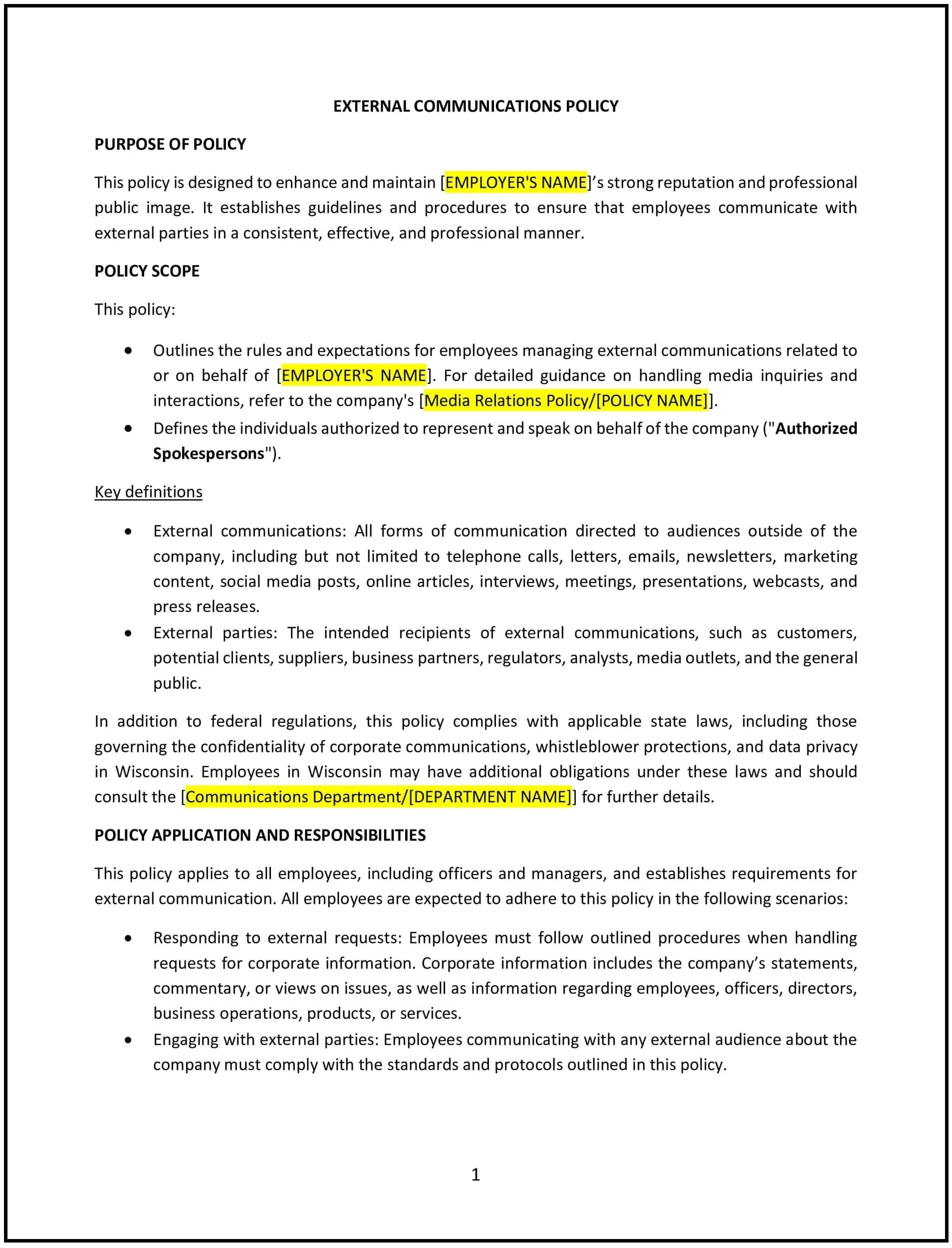External communications policy (Wisconsin): Free template
Got contracts to review? While you're here for policies, let Cobrief make contract review effortless—start your free review now.

Customize this template for free
External communications policy (Wisconsin)
An external communications policy helps Wisconsin businesses manage how they communicate with the public, clients, customers, media, and other external stakeholders. This policy defines the appropriate channels, procedures, and guidelines for conveying the company's message to ensure consistency, accuracy, and alignment with company values. It also protects the company from the risks associated with misinformation or unauthorized disclosures.
By implementing this policy, businesses can ensure that external communications are professional, aligned with company goals, and helps achieve compliance with relevant laws and regulations.
How to use this external communications policy (Wisconsin)
- Define communication objectives: Clearly outline the objectives of external communications, such as promoting the company's brand, providing accurate information, and maintaining positive relationships with stakeholders, including customers, suppliers, media, and the public.
- Identify authorized spokespersons: Specify who within the company is authorized to speak on behalf of the organization. This may include executives, marketing or PR teams, or designated spokespersons, ensuring that only qualified individuals communicate publicly.
- Establish communication channels: Outline the approved channels for external communications, including company websites, social media platforms, press releases, and direct communications with clients or the media. Specify which platforms or outlets should be used for specific types of communication.
- Set guidelines for tone and messaging: Establish guidelines on the tone and style of external communications, ensuring consistency in messaging across all platforms. Emphasize professionalism, respect, and clarity, and align the messaging with the company’s values and branding.
- Address media interactions: Provide clear procedures for interacting with the media, including how to handle media inquiries, conduct interviews, and respond to press requests. Establish a system for handling crisis communications and addressing negative publicity.
- Maintain legal compliance: Ensure that external communications comply with relevant legal regulations, such as advertising laws, consumer protection laws, and privacy regulations (e.g., GDPR or Wisconsin state privacy laws).
- Protect confidential and proprietary information: Outline procedures to prevent the unauthorized disclosure of sensitive, confidential, or proprietary information in external communications. Specify how employees should handle confidential data, trade secrets, and intellectual property.
- Encourage transparency: Promote transparency in external communications, ensuring that employees and stakeholders are informed about key company developments, policies, and practices.
- Monitor and respond to public feedback: Define how the company will monitor public sentiment and feedback across external communication channels. Provide guidance on responding to customer complaints, negative reviews, or feedback on social media.
- Review and update regularly: Ensure that the policy is reviewed regularly and updated as needed to keep pace with changes in communication technologies, public expectations, or legal requirements.
Benefits of using this external communications policy (Wisconsin)
This policy offers several benefits for Wisconsin businesses:
- Promotes brand consistency: By standardizing external communication methods, the policy ensures that all messages align with the company’s brand, values, and goals.
- Reduces the risk of miscommunication: Clear guidelines on who is authorized to speak on behalf of the company and how to convey information help reduce the risk of misinformation or inconsistent messaging.
- Protects company reputation: The policy helps protect the company’s reputation by ensuring that external communications are professional, accurate, and aligned with company values, reducing the likelihood of public relations issues or legal risks.
- Supports legal compliance: By addressing legal considerations and providing guidance on handling sensitive information, the policy supports the company’s compliance with relevant advertising, privacy, and disclosure regulations.
- Fosters positive relationships with stakeholders: Clear communication with customers, clients, and the public can strengthen relationships, improve customer trust, and enhance the company’s standing in the market.
- Enhances crisis management: The policy provides guidelines for handling media inquiries, crisis situations, or negative publicity, ensuring a consistent and controlled response during emergencies.
Tips for using this external communications policy (Wisconsin)
- Communicate the policy clearly: Ensure that all employees, especially those in customer-facing roles or those involved in communications, understand the policy and their responsibilities regarding external communications.
- Designate communication officers: Identify key employees responsible for managing external communications and provide them with the necessary tools and training to handle media inquiries, customer communications, and social media interactions effectively.
- Regularly update the policy: Periodically review the policy to ensure it reflects changes in communication technologies, industry standards, or legal regulations. Keep employees informed about any updates to the policy.
- Align messaging with company goals: Ensure that all external communications support the company’s broader objectives, including promoting its products, services, and corporate values. Consistent messaging helps build trust with customers and stakeholders.
- Monitor and respond to feedback: Regularly monitor external channels for feedback, complaints, and suggestions, and ensure that responses are timely, respectful, and aligned with the company’s values.
- Encourage proactive communication: Don’t wait for crises to occur—encourage proactive communication to engage with customers and stakeholders, sharing relevant updates, news, and information that showcases the company’s achievements and efforts.